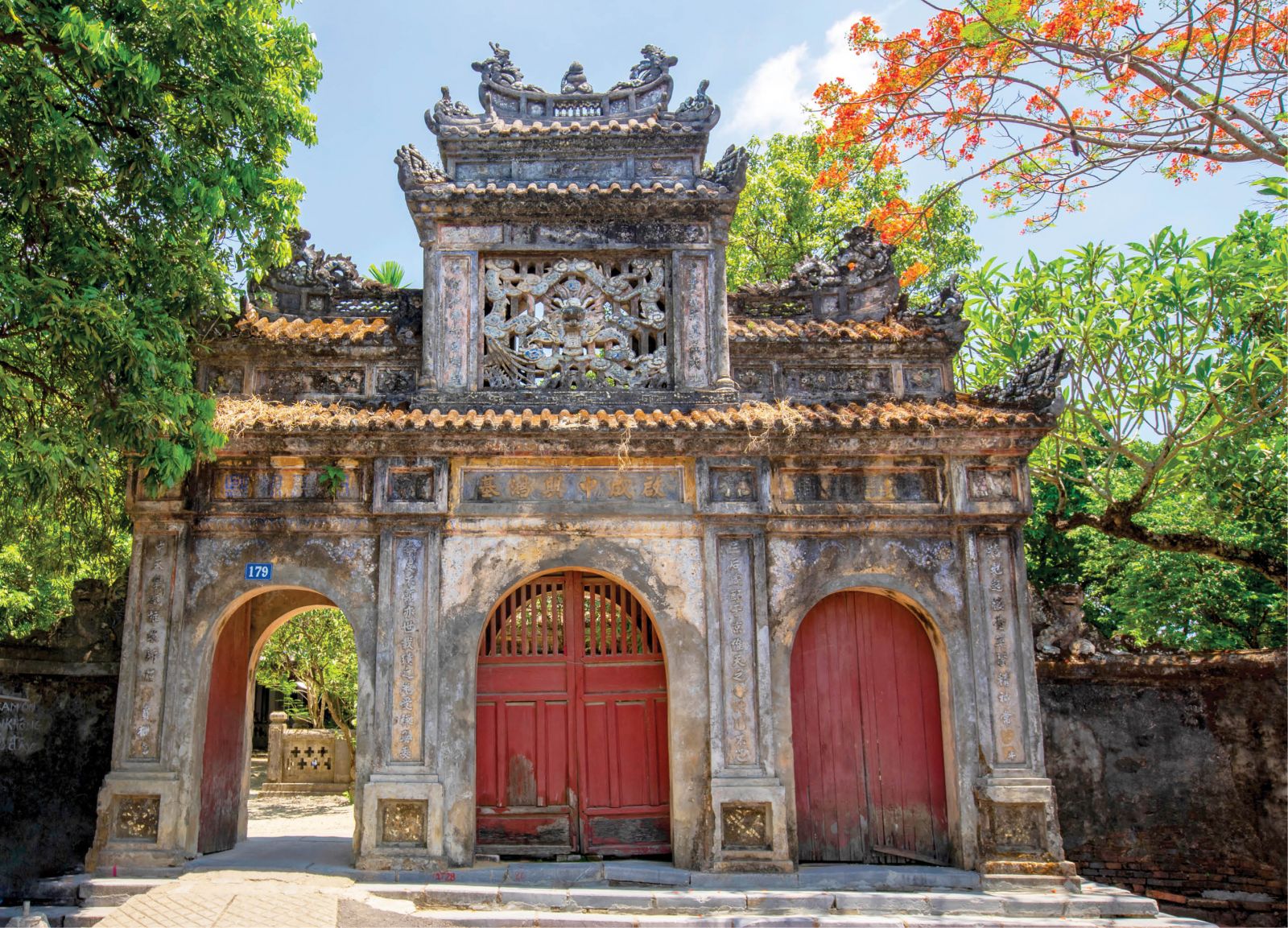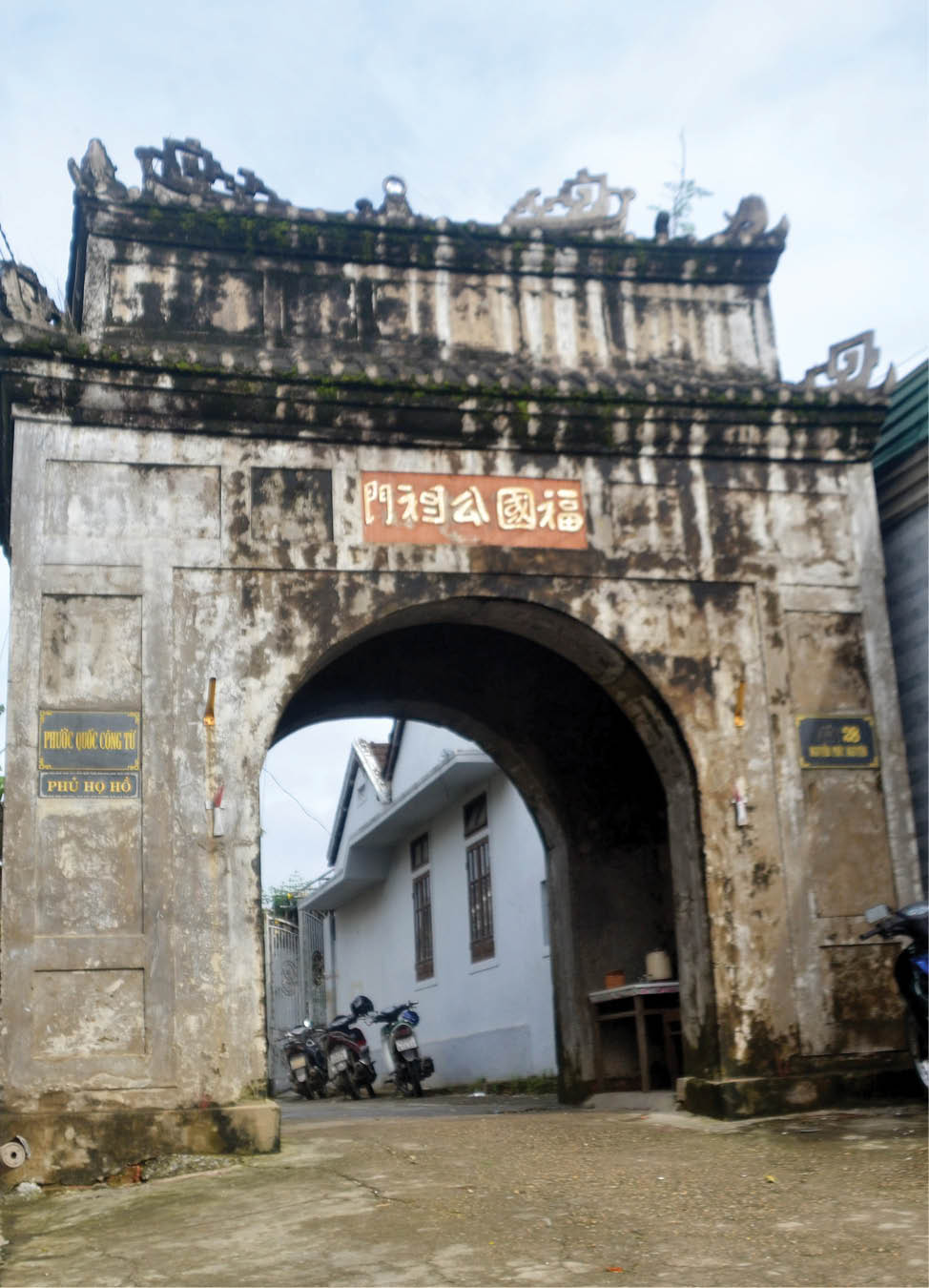
Each gate has different cultural and historical values
In the midst of these quiet spaces, I suddenly remembered the words of the writer Tran Kiem Doan in his famous work: “A smile still remains in the hundred-year-old place. On this side, there is a person still looking for the period of Quoc Hoc - Dong Khanh from the old Hue alleys”.
The land of gates
To make up for the lack in quantity, Hue’s gates preserve the “flow of time” through the variety of gates.
Right in the city, if you go to Kim Long, Vy Da, Bao Vinh ... you will see the old palaces or the gates, temples and other works built hundreds of years ago. Each gate has different cultural and historical values.
What makes it interesting is that a gate not only is the entrance, but also has its own function in the past... An Hien garden gate is a model of architecture which blends into nature; the gates of the princes’ palaces are historical symbols of noble families; the gate of the Industrial College is the place which opened the first industrial lecture hall of Indochina...
Behind the modest gates is a plethora of culture and memory. Looking at the gates, one can guess the family position, not the political position but the family tradition of "homeowners".
The higher their position in society, the more attention Hue people pay to rites and family rules. Do not judge Hue people to be cumbersome. Rather, it is a solemn investment in the rituals and standards of life.
According to Dr. Tran Dinh Hang, Director of the Vietnam National Academy of Culture and Arts in Hue, gates were built in association with the socio-economic situation. Their beautiful imprint is that regardless of the material, they look modest and harmonious within their space.

The "nestled" gates still carry lasting value
The old gate in Hue is often placed in harmony with the walkway and garden. The entrance is long and airy, as if giving a message to the guests that it is necessary to take a careful step, to contemplate, to understand the personality and style of the host. This also reminds each person to be mindful and careful in all the things they do.
Gradually opening the "doors" to people's hearts
Mr. Vinh Phu, the custodian of Tung Thien Vuong palace, said that in his lifetime, Tung Thien Vuong had two virtues passed down to his descendants. First, he asked his father, the king, to allow him to take care of his mother in his palace. Tung Thien Vuong palace was also a rare place which had a house to worship the mother. The second virtue is that in life, learning is a journey that never ends.
He was praised by the folk as "The Filial Prince" and "The Modest Prince". His descendants nowadays always remind each other to follow in their ancestors’ footsteps and to live with morality.
“Many companies come to us with an offer of exploiting the place for tourism. Our family has agreed that this is a positive turn, and that it will restore and promote the good old ways of life. However, if it is carried out, the process must be sound and methodical so as not to affect the family’s rules and traditions,”, Mr. Vinh Phu shared.
To gradually open the materialistic gates, it is necessary to open the "gates" of the human hearts. That is opening the gate of State management agencies to coordinate implementation; between the government and the people; between businesses and people; and people to people. Each opened gate will open up unique stories in the exploitation of Hue tourism.
Dr. Tran Dinh Hang said: “The door is the conventional boundary of distances. Clearing the gaps and linking the gates will contribute to bringing traditional quintessential values to everyone. There are many angles and different gates, but always looking in a positive direction and converging is the spirit that Hue needs to aim for!”.
If it is opened, behind the gates are the rituals, ordination rites, traditional quintessence... bringing visitors to the world of the ancestors' heritage. From there, we can refine and string together a narrative to be passed down through space and time so that the core values can be cherished and appreciated by future generations.
According to Mr. Hoang Van Khanh, Director of Vietravel - Hue Branch, service exploitation in the places which have traces of honorable family would be elders wearing ao dai drinking tea with guests; there would be places for reading, for accommodation, and entertainment. Guests would be immersed in the experience in that traditional space. This type of travel service is a high-class, unique product!
Bringing the story of cultural excursions through the gates, Mr. Nguyen Van Phuc, Deputy Director of the Department of Tourism, said that it is possible to form a city tour by road and by river passing through these destinations. Building stories, forming traditional educational tours and ethnic quintessence are unique products. Currently, Chau Huong Vien is a destination which is developing in this orientation, where the old palace life will be re-enacted. After this pilot, the model will be expanded as a long-term tourism exploitation in Hue.
Story: Duc Quang
Photos: Tuan Kiet - Duc Quang